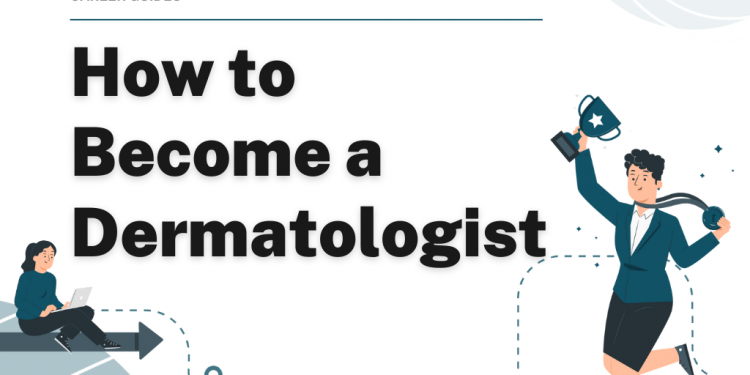Dermatologists play a important position in diagnosing and treating pores and skin problems, bettering their sufferers’ general well being and well-being. If you might have a ardour for skincare, a eager curiosity in medical science, and a need to assist others, pursuing a profession as a dermatologist could be the proper path for you. Here, we’ll discover the steps and necessities to change into a dermatologist, from training and coaching to licensing and specialization choices.
Common Steps to Becoming a Dermatologist
The ABCs of Becoming a Dermatologist
Dermatology is a fascinating discipline that facilities on diagnosing, treating, and stopping all types of pores and skin circumstances. A powerful instructional basis is important to change into a dermatologist. By the top of your instructional street, nevertheless, you’ll be an skilled in diagnosing and treating circumstances like pimples, pores and skin most cancers, and eczema.
Is a Dermatology Degree Necessary to Become a Dermatologist?
The reply is sure. Obtaining a dermatology diploma is a essential step in turning into a licensed dermatologist. The street to turning into a dermatologist requires a number of years of rigorous training past simply the undergraduate diploma. Dermatologists bear a few years of education, together with medical faculty, residency, and fellowship applications. A look on the dermatologist job description, which includes diagnosing and treating pores and skin circumstances, conducting pores and skin most cancers screenings, and offering beauty procedures, underscores the essential position of training on this discipline.
Here are the widespread steps in pursuing a dermatology diploma:
- Obtain a Bachelor’s Degree: The first step is to full a bachelor’s diploma in a related discipline similar to biology, chemistry, or pre-medicine. This undergraduate program offers a strong scientific information base and prepares you for superior research in medical faculty.
- Medical School: After finishing your bachelor’s diploma, attending medical faculty is subsequent. Admission to medical faculty sometimes requires a aggressive rating on the Medical College Admission Test (MCAT) and a robust tutorial document. Medical faculty sometimes lasts 4 years and combines classroom studying and medical rotations.
- Residency: Following medical faculty, aspiring dermatologists should full a residency program in dermatology. Dermatology residencies sometimes final three years and contain intensive coaching in diagnosing and treating pores and skin problems underneath the steerage of skilled dermatologists. Residents achieve hands-on expertise in numerous areas, together with medical dermatology, surgical dermatology, pediatric dermatology, and dermatopathology.
- Board Certification: After finishing residency, dermatologists can pursue board certification via the American Board of Dermatology (ABD) or different related boards. Board certification demonstrates experience in dermatology and includes passing an examination that assesses information and medical expertise.
Importance of a Dermatology Degree as You Become a Dermatologist
Obtaining a diploma in dermatology is essential for a number of causes. First, it offers in-depth information of the pores and skin’s construction, operate, and ailments. Dermatology-specific coursework equips aspiring dermatologists with a complete understanding of assorted pores and skin circumstances, their analysis, and therapy modalities. Additionally, a dermatology diploma demonstrates a dedication to the sector and enhances credibility when searching for employment or pursuing additional specialization.
Basically, a dermatology diploma is:
- Essential for diagnosing and treating numerous pores and skin circumstances.
- Enables performing pores and skin most cancers screenings precisely.
- Provides the information and experience for providing beauty procedures.
- Ensures the power to ship specialised care and proposals.
- Establishes credibility and belief with sufferers and friends.
Duration and Cost of Obtaining a Dermatology Degree at University
Learning how to change into a dermatologist isn’t for the faint-hearted, because it requires dedication and dedication. The period and price of finding out dermatology at a college can fluctuate relying on the academic pathway and the nation or area during which you pursue your diploma. Generally, it takes at the very least 4 years to acquire a dermatology diploma from a respected college, however the time and price can fluctuate relying on this system and establishment.
In the United States, for instance, the standard timeline includes 4 years of undergraduate examine, 4 years of medical faculty, and three years of dermatology residency. Once you’re totally certified, your dermatologist wage is nicely sufficient to compensate for the arduous work, upwards of six figures per 12 months.
However, we are able to’t allow you to play choose with out additionally considering that the tuition and fees for medical faculty fluctuate extensively, spanning from US$26,000 to US$70,000. It’s necessary to analysis universities and applications’ particular necessities, period, and related prices. Financial aid, scholarships, and grants could also be accessible to assist offset the price of training for aspiring dermatologists.
Can I Become a Dermatologist Through Online Education?
Becoming a dermatologist sometimes requires finishing a rigorous instructional and coaching program that features hands-on medical expertise. While on-line assets could also be accessible to complement studying or present persevering with training for working towards dermatologists, it’s typically unattainable to change into a dermatologist solely via on-line training.
Dermatology includes diagnosing and treating numerous pores and skin circumstances, typically necessitating sensible expertise, direct affected person interplay, and supervised coaching. Medical colleges and dermatology residency applications sometimes require in-person attendance to guarantee complete coaching and the event of medical expertise.
However, it’s value noting that on-line platforms and expertise can play a priceless position in enhancing medical training and offering entry to instructional assets, analysis literature, and telemedicine choices for session and follow-up care.
Reliable Online Resources to Become a Dermatologist
There are a number of respected internet assets accessible that may help in studying expertise associated to dermatology. It’s necessary to notice that whereas these assets may be useful for self-study and increasing information, they need to not change formal medical training, medical coaching, or session with certified dermatologists. They can, nevertheless, complement information and supply priceless insights. Here are a few examples:
- DermNet NZ: This complete dermatology useful resource provides numerous articles, medical pictures, and academic supplies.
- American Academy of Dermatology: AAD offers instructional assets, webinars, and on-line programs for each dermatologists and people aspiring to change into one.
- Medscape Dermatology: Offers dermatology articles, case research, and academic supplies, in addition to updates on the most recent analysis and medical tips.
- PubMed: Access a huge database of dermatology analysis articles and medical research to keep up to date on the most recent developments within the discipline.
- Dermatology Forums: Participate in on-line dermatology boards and communities the place you possibly can ask questions, share information, and study from skilled dermatologists and friends. Websites like Student Doctor Network (SDN) and Reddit’s r/Dermatology are good locations to begin.
- VisualDx: VisualDx is a diagnostic medical choice help software that may improve dermatology information. It provides a huge picture library and permits customers to discover visible representations of assorted pores and skin circumstances to support in differential analysis.
- Dermatology Education Foundation: The Dermatology Education Foundation provides a vary of assets centered on dermatology. It offers instructional supplies, webinars, and case research to improve information and expertise on this specialised space.
A Practical Approach to Become a Dermatologist
It takes training and sensible expertise mixed to change into a dermatologist. Although the dermatology diploma coursework consists of anatomy, physiology, and pathology, amongst different topics, it’s equally necessary to achieve expertise.
Residency Programs: A Dermatologist’s Equivalent to Internship
Internship alternatives for dermatologists sometimes refer to the residency program that follows the completion of medical faculty. Dermatology residency applications sometimes final three years and are structured to present broad publicity to completely different elements of dermatology. Residents rotate via numerous subspecialties inside dermatology, similar to medical dermatology, surgical dermatology, pediatric dermatology, and dermatopathology. This permits you to achieve hands-on expertise in diagnosing and treating a big selection of dermatological circumstances, performing procedures, and managing affected person care.
The residency program offers ample alternatives for you to study via medical encounters, case discussions, grand rounds, and analysis tasks. Residents even have the possibility to work in various medical settings, together with hospitals, outpatient clinics, and specialised dermatology facilities. This publicity helps you develop experience in managing complicated instances and dealing with completely different affected person populations.
It’s value noting that the applications are sometimes accessible via accredited dermatology residency programs affiliated with medical establishments and hospitals. Aspiring dermatologists should undergo a aggressive utility course of and safe a residency place to full their internship and additional their coaching within the discipline.
Here are the important thing steps to securing an internship as a dermatologist:
- Residency Match: Dermatology residencies are extremely aggressive, and candidates should undergo the National Resident Matching Program (NRMP) or the Electronic Residency Application Service (ERAS) to safe a residency place. The matching course of often happens through the ultimate 12 months of medical faculty.
- Dermatology Residency: Once accepted into a dermatology residency program, you’ll bear specialised coaching in dermatology.
- Fellowships (Optional): After finishing a dermatology residency, some dermatologists select to pursue extra fellowship coaching in subspecialties similar to dermatopathology, pediatric dermatology, or beauty dermatology.
9 Essential Skills You Will Learn as a Dermatologist
As a dermatologist, you’ll purchase various expertise important for diagnosing and treating numerous pores and skin circumstances. Here are some key expertise you’ll study and develop all through your profession as a dermatologist:
- Clinical Assessment: You will find out how to carry out complete medical assessments of sufferers, together with conducting thorough medical histories, performing bodily examinations, and evaluating pores and skin manifestations. This ability allows you to diagnose dermatological circumstances and develop acceptable therapy plans precisely.
- Dermatological Procedures: Dermatologists are skilled in numerous procedures, similar to pores and skin biopsies, cryotherapy, laser therapies, chemical peels, and surgical excisions. You will study the technical expertise required to carry out these procedures safely and successfully.
- Dermatopathology: Dermatopathology includes the microscopic examination of pores and skin tissue samples to diagnose pores and skin ailments. As a dermatologist, you’ll develop expertise in deciphering histopathological findings and correlating them with medical observations to attain correct diagnoses.
- Treatment Planning: Dermatologists formulate individualized therapy plans for sufferers based mostly on their particular circumstances, preferences, and medical historical past. You will study to take into account numerous components, such because the severity of the situation, potential unwanted side effects, affected person expectations, and accessible therapy choices to develop efficient and tailor-made therapy methods.
- Patient Communication and Education: Effective communication is essential in dermatology. You will study to talk complicated medical info successfully to sufferers, together with explaining diagnoses, discussing therapy choices, and offering directions for self-care and medicine administration. Additionally, educating sufferers about preventive measures, way of life modifications, and solar safety is a crucial side of dermatological apply.
- Multidisciplinary Collaboration: Dermatologists typically collaborate with different healthcare professionals, together with main care physicians, oncologists, plastic surgeons, and allergists, amongst others. You will develop expertise in interdisciplinary collaboration to guarantee complete and coordinated affected person care.
- Research and Evidence-Based Practice: Dermatology is a discipline that constantly evolves with new analysis, therapies, and applied sciences. As a dermatologist, you’ll develop expertise to keep up to date with the most recent scientific developments, critically consider medical literature, and incorporate evidence-based practices into your medical decision-making.
- Cultural Competency: In right now’s various society, cultural competency is important. You will study to present culturally delicate care and take into account the impression of cultural components on dermatological circumstances and therapy decisions.
- Record Keeping: Proper documentation and medical document conserving are essential for affected person care and authorized functions. You will study to keep correct and complete affected person information. Notwithstanding, dermatologists can hire medical scribes to assist with most of those duties.
Maintaining Work-Life Balance as a Dermatologist
It is important for dermatologists, like different healthcare professionals, to actively handle their work-life stability to forestall burnout and keep their general well-being. This might contain efficient time administration, setting life like expectations, delegating duties when acceptable, and searching for help from colleagues and household. Finding a stability that works for every particular person is essential.
The work-life stability of a dermatologist can fluctuate relying on a number of components, together with the precise apply setting, work setting, private preferences, and particular person circumstances. Here are some components that may affect the work-life stability of a dermatologist:
- Practice Setting: Dermatologists can work in numerous settings and their work-life stability might differ based mostly on the calls for and expectations of the precise apply setting. For instance, dermatologists in non-public apply might have extra management over their schedules and affected person load, permitting for better flexibility.
- Work Hours: The typical work hours for dermatologists can fluctuate. In non-public apply, dermatologists might have extra management over their work hours, however they might additionally want to accommodate affected person wants, together with night or weekend appointments. In distinction, dermatologists working in hospital or tutorial settings might have extra structured schedules however may have alternatives for analysis or educating, which may present a completely different stability.
- Patient Load: The variety of sufferers seen every day can impression work-life stability. Higher affected person hundreds can lead to busier schedules and probably extra time spent at work. However, this will fluctuate relying on particular person apply preferences and the capability to handle affected person volumes successfully.
- On-Call Responsibilities: Dermatologists might have on-call duties, notably in hospital settings or when managing pressing or emergent instances. On-call duties can impression private time and will require being accessible outdoors common working hours. However, the frequency and depth of on-call duties can fluctuate relying on the precise apply and employment preparations.











